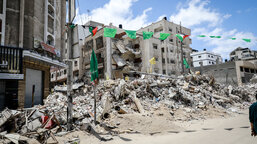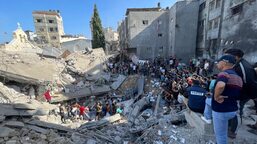Half a year of intense fighting, shelling and bombing has left absolute devastation in Gaza. Over 33,000 Palestinians, including 14,500 children, have been killed, another 75,000 injured. Almost two million people have been displaced, many of them repeatedly. Half of Gaza's population is at imminent risk of famine, and malnutrition among children has reached unprecedented levels. Despite the dire conditions, Caritas continues to provide humanitarian aid to the people of Gaza.
DONATE TO HELP CIVILIANS IN GAZA
An unprecedented humanitarian crisis
It has been 6 months since the brutal attack on Israel by Hamas fighters and the start of the current escalation of the war in Gaza. Gaza, which is sometimes referred to as a giant open-air prison, has turned into one of the most dangerous places in the world for civilians. After six months of relentless bombing throughout Gaza - including in densely populated areas where evacuations had been ordered - the level of devastation, hunger and loss has reached tragic levels. The humanitarian situation on the ground is catastrophic. Over 130 hostages are also still being held in Gaza.
Drinking water, food, medicine and health care have become luxuries that few people can access. The situation is many times worse in northern Gaza, where people are surviving on an average of 245 calories a day and where more than 50,000 children under five are acutely malnourished, and dozens have already died of malnutrition and dehydration. Gaza is on the brink of famine. 1.1 million people - almost half of the total population - face catastrophic food insecurity as a result of the intense conflict and the totally inadequate supply of humanitarian aid. Gazans currently account for 80% of all people facing famine or catastrophic hunger conditions worldwide.
The war also has a dramatic impact in the West Bank and East Jerusalem, where there has been an increase in violence, harassment, arbitrary detentions and house demolitions. Since October, there have been more than 600 settler attacks on Palestinians, resulting in hundreds of casualties. In addition, Israel has closed its borders and withdrew work permits. This has serious socio-economic consequences for the already impoverished population in the Occupied Palestinian Territory.
No place in Gaza is safe
Humanitarian aid deliveries are wholly inadequate compared to the enormous need. Moreover, its distribution to those in need is significantly complicated and often prevented by the very poor security situation, the extensive ground military operations and intensive aerial bombardment of densely populated urban areas.
Two hundred aid workers, including two of our colleagues, and hundreds of medical workers have been killed in Gaza. Attacks on them, as well as on civilians, is in violation of international law, which also guarantees the civilians an adequate supply of humanitarian aid. Unfortunately, this, too, is failing disastrously in the current conflict. The people of Gaza are thus facing an unprecedented humanitarian crisis, surviving under constant fire in inhumane conditions without sufficient access to water, food, sanitation and healthcare.
There is no place of refuge in Gaza. Attacks happen all over its territory, and hospitals, schools, churches or mosques are not spared. Moreover, this narrow strip of land is one of the most densely populated places in the world. At the same time, it is an impenetrably closed area from which it is impossible to leave. Intensive air strikes and forced evacuations thus have a disastrous impact on the people of Gaza.
Sheer devastation
More than 60% of houses have been damaged or destroyed. Large areas, particularly in the northern parts of the Strip and in the Khan Younis area, have been razed to the ground. Critical infrastructure is also in ruins. According to an interim report by the World Bank, the EU and the UN, the estimated cost of direct damage to critical infrastructure in the Gaza Strip is approximately 18.5 billion dollars. About 80% of establishments and businesses are also destroyed. It is estimated that just clearing the rubble will take years.
More than half of the total population of 2.3 million is now crowded into the Rafah area in the south of the Gaza Strip, 20% of its total area. As a result of sheer overpopulation, the area is entirely unrecognisable. People with their makeshift shelters have flooded almost all the available space and cannot even cover their basic needs. According to UNICEF, for example, there is one toilet for every 850 people in Rafah, whereas the global standard is one toilet for a maximum of 20 people in a humanitarian emergency. The air strikes on Rafah, and the forthcoming Israeli ground operation in the area would have immeasurable consequences.
What's next
In response to mounting international pressure, Israel has, in recent days, taken several measures to reduce the suffering of the people of Gaza. The delivery of humanitarian aid should be made safer. At the same time, the number of trucks allowed into the Gaza Strip will be increased, and the capacity of existing crossings will also increase. The Erez crossing in northern Gaza is planned to temporarily reopen to transfer much-needed food, water and sanitation, shelter and medical supplies from Ashdod port, which will be opened for this purpose. Israel has also approved the reopening of 20 bakeries and a water pipeline in northern Gaza.
However, a lasting and sufficient solution to the crisis requires a ceasefire, which has long been called for by Caritas Czech Republic.
Caritas continues to help in Gaza
Despite the dire conditions, Caritas is still helping directly in Gaza. One hundred employees of our partner organisation, Caritas Jerusalem, mainly focus on providing medical care. But they are also dedicated to supporting the displaced population and providing basic humanitarian needs. Caritas network has made almost thirty million euros available so far to help the affected people in Gaza, the West Bank, and Jerusalem, to help one million people with basic needs. Caritas has also repeatedly called for a ceasefire and the release of all hostages and unjust detainees.
Thank you to all those who join us in helping civilians in Gaza by contributing to the Caritas for Gaza appeal.
DONATE TO HELP CIVILIANS IN GAZA













